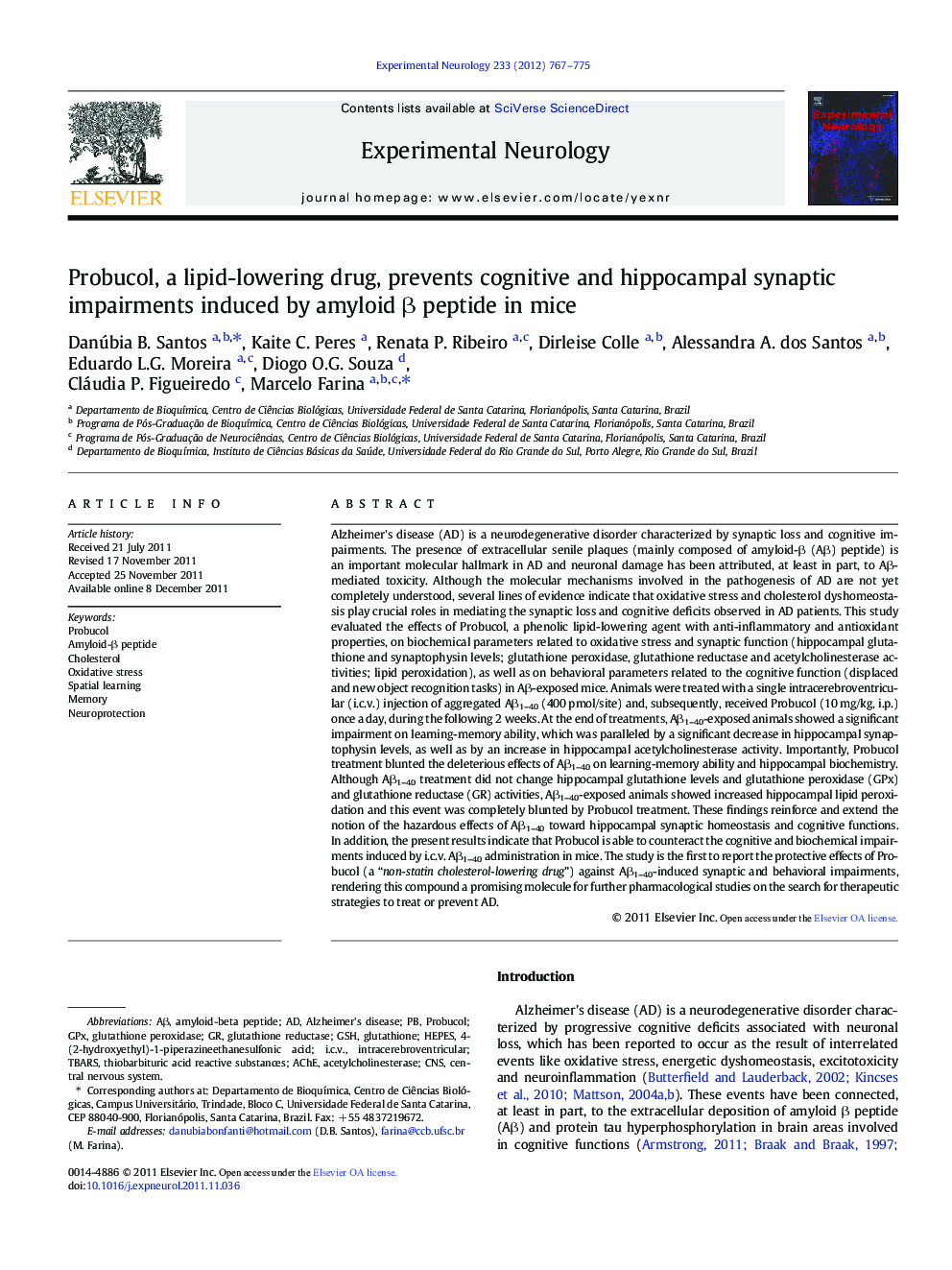| کد مقاله | کد نشریه | سال انتشار | مقاله انگلیسی | نسخه تمام متن |
|---|---|---|---|---|
| 6019006 | 1186531 | 2012 | 9 صفحه PDF | دانلود رایگان |

Alzheimer's disease (AD) is a neurodegenerative disorder characterized by synaptic loss and cognitive impairments. The presence of extracellular senile plaques (mainly composed of amyloid-β (Aβ) peptide) is an important molecular hallmark in AD and neuronal damage has been attributed, at least in part, to Aβ-mediated toxicity. Although the molecular mechanisms involved in the pathogenesis of AD are not yet completely understood, several lines of evidence indicate that oxidative stress and cholesterol dyshomeostasis play crucial roles in mediating the synaptic loss and cognitive deficits observed in AD patients. This study evaluated the effects of Probucol, a phenolic lipid-lowering agent with anti-inflammatory and antioxidant properties, on biochemical parameters related to oxidative stress and synaptic function (hippocampal glutathione and synaptophysin levels; glutathione peroxidase, glutathione reductase and acetylcholinesterase activities; lipid peroxidation), as well as on behavioral parameters related to the cognitive function (displaced and new object recognition tasks) in Aβ-exposed mice. Animals were treated with a single intracerebroventricular (i.c.v.) injection of aggregated Aβ1-40 (400 pmol/site) and, subsequently, received Probucol (10 mg/kg, i.p.) once a day, during the following 2 weeks. At the end of treatments, Aβ1-40-exposed animals showed a significant impairment on learning-memory ability, which was paralleled by a significant decrease in hippocampal synaptophysin levels, as well as by an increase in hippocampal acetylcholinesterase activity. Importantly, Probucol treatment blunted the deleterious effects of Aβ1-40 on learning-memory ability and hippocampal biochemistry. Although Aβ1-40 treatment did not change hippocampal glutathione levels and glutathione peroxidase (GPx) and glutathione reductase (GR) activities, Aβ1-40-exposed animals showed increased hippocampal lipid peroxidation and this event was completely blunted by Probucol treatment. These findings reinforce and extend the notion of the hazardous effects of Aβ1-40 toward hippocampal synaptic homeostasis and cognitive functions. In addition, the present results indicate that Probucol is able to counteract the cognitive and biochemical impairments induced by i.c.v. Aβ1-40 administration in mice. The study is the first to report the protective effects of Probucol (a “non-statin cholesterol-lowering drug”) against Aβ1-40-induced synaptic and behavioral impairments, rendering this compound a promising molecule for further pharmacological studies on the search for therapeutic strategies to treat or prevent AD.
⺠Probucol is a “non-statin” cholesterol-lowering drug. ⺠This study evaluated the effects of Probucol against Aβ1-40-induced synaptic and behavioral impairments in mice. ⺠i.c.v. Aβ1-40 administration caused cognitive and synaptic impairments. ⺠Probucol treatment blunted the deleterious effects of Aβ1-40.
Journal: Experimental Neurology - Volume 233, Issue 2, February 2012, Pages 767-775